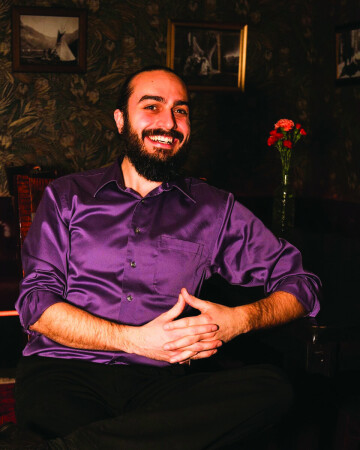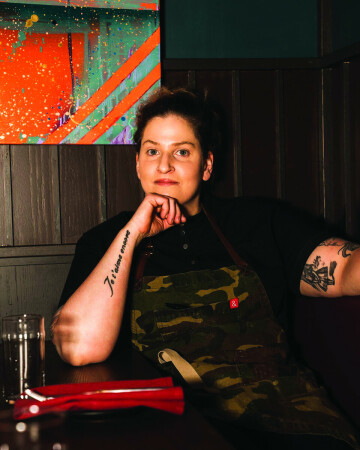1864 Noir Bar & Restaurant
Taylor Owens | Friday Sep. 1st, 2023
Allison Fasano and Blake Mackie have hit Main Street and the Bozeman food scene with a restaurant that blends Bozeman’s historic roots with elements of the Bozeman we know today.
est. 1864 Noir Bar & Restaurant is a new speakeasy that transports you to a different time when you walk through the doors. Antique touches meet modern innovations in this cozy atmosphere, all while paying homage to the history of this beautiful mountain town we call home.
I sat down with both owners to chat about their restaurant, vision, and the collaboration that brought est. 1864 to life this past year.
Taylor Owens: How was est. 1864 conceptualized?
Blake Mackie: The concept mainly comes from 1864, the date that Bozeman was created as a federal city. Paying homage to Montana history as ‘outsiders,’ we really wanted to make sure locals knew that we came out here to care about and help build the community, and help preserve the history and what Bozeman is all about, not to change it and bring something different to it. I think est, 1864 as a whole is recognizing that; it’s a balance of the history, as you’ll see in this room, and modern. It’s a little bit of us, it’s a little bit of Montana. That was the main goal, to use as many local antique items as possible, to recognize that we’re not here just to make a quick buck.
TO: What would you like people to experience when they walk through your doors?
Allison Fasano: A lot of times people think, ‘1864. Are you making food from 1864?’ I think we’ve created these warm, almost saloon-like, old Montana vibes here. We have an all-wood bar; it’s very warm and welcoming. Of course, being a noir bar, it’s a little bit darker. That’s the ambiance we’ve created here. But you’ll see a lot of old and new Montana on the walls, and you’ll recognize some familiar faces above the bar. If you ever want to know about somebody behind the bar, Blake’s the guy to ask. He could tell you who all the people are and the story behind them. As non-locals here, it’s important that we did our history research prior to opening this restaurant.
BM: I think a big point is that we’re not fine dining. I want regular [people]… the farmers, everybody blue collar, white collar, to feel comfortable. It’s more ‘elbows on the table.’ A lot of what I’ve learned about Montana after the 10 years I’ve been away is that Montana is what it is. The ‘if you don’t like it, don’t come here’ concept is what a lot of people think. If it’s too cold for you, if it’s too country, or if it’s 15 years behind the curve, don’t come here to change it. That’s the implementation with the restaurant as a whole. Allison’s doing house-made pasta, which she excels at. She also has a kimchi burger because she collaborated with Whistle Pig Korean. Then we have a labneh dip, which is a Middle Eastern, Mediterranean-style dish. This is what she likes, what she wants to do. The same thing goes for me and the guys in the bar. We have Japanese whiskey and vodka. We focus on many different culinary elements. I think that’s what Montana does really well, with nature and community. That’s supposed to be the whole concept here. It’s Bozeman. You get a lot of different cultures, and things are going to happen here. I think that’s just us preparing for it and trying to recognize it as much as possible.
TO: What do regulars keep coming back for?
AF: They love the constant rotation. I need to mention our meat-to-please, our rotation of local farms and our ways to work with them because they don’t have abundance. Of course, regulars want to work their way through the cocktail program here. Sometimes, somebody might get a mocktail because we do have that, great non-alcohol drinks. A lot of times people are like, ‘Oh, I had this drink last time. Maybe I’ll try a rum-based drink,’ or maybe it’s the food. A lot of people like the meatballs. Every night we hear someone say, ‘These are the best meatballs I’ve had.’ It’s a mixture of the bar program, the food, and the staff. They’re very warm and welcoming. Or, people come in and want to talk to Blake, or they want to talk to me. Sometimes I think that’s why they come back, because we’re always in here. I mean, if we’re ever not here, I’m sick. We’re here every day, and we talk to customers. I’ll walk the floor and talk to tables, and I get to know their names.
BM: It’s about community, period. That’s what this is all about. I say this all the time. Allison’s heard it a thousand times. But if you’re in this industry to get rich, you’re in the wrong industry. This industry is about people, and passion, and communication, and being social and touching the community in some essence, some way or form. We continue to shop local, and do everything as much as possible locally. That’s why we moved out here from big cities, is to be part of a small community, to be able to walk around and recognize people. I think that’s the major thing that brings people back.
TO: Do you have a favorite menu item and cocktail?
AF: My favorite dish on our menu currently is the fusilli, with braised osso buco. The meat is from Wickens Ranch. So, we have osso buco with this braised tomato sauce, basil and a fresh gremolata. When I taste it, it reminds me of Sundays growing up in Brooklyn. That’s why I always recommend it, because every Sunday we would eat pasta at 3:30. It’s not something my grandparents would make; it’s a more culinary, upscale take on what I grew up with. A lot of times we have labneh on the menu. My grandma was Jewish. That’s an Israeli, Mediterranean dish, or meatballs. My background is in Italian cuisine. My father was Italian; that’s what I cooked. A lot of times the menu is inspired from my background. I went to culinary school in Italy. The menu just tells the story of what I grew up with, highlighting the ingredients.
BM: Food-wise, I agree with her, it’s the pasta. I hate mushrooms. I’m not a big fan. I don’t hate them, but I’m not going to ask for them. This dish is covered in mushrooms, and I love it! The pasta is just so incredible here. It’s like a little bonus and you don’t realize that it’s almost the soul of a lot of what we do here. Drink-wise, that’s a hard one, because there’s so much up there. As a bartender, I drink anything and everything. But I’d say, our espresso drinks. The Cafe Noir, which is the espresso martini. You’ve got to have a good espresso to do those drinks right. I felt like it was a rarity in this town. We splurged and bought that espresso machine and made sure we were able to do that. I’d go between the Cafe Noir and the Carajillo, which is a Spanish style, espresso martini, basically.
TO: Do you use a local roaster?
BM: We do. It’s called Unrivaled. I met the owner of the company; he kept bringing me samples and he was in here while we were building, and, once again, community. I was like, ‘You know what? The espresso we use with him is a good, dark roast, and I really like it.’ I was like, ‘All right, we’ll team up with you.’ We’ve had other people ask us to carry their coffee, which we rotate and mix around. But right now it’s Unrivaled.
BM: We also have a beer on tap from New Ventures, which is the brewery in Four Corners. Once again, this is community. He did some pop-ups with his food truck outside the brewery and created a great connection. They come in here, they love us. We’re the only place in the country to have their beer on tap. They’ve been making beer for us on tap, so we could carry it. Most people don’t know it, but that’s local. The local stuff we carry, for the most part, is underground, unknown—smaller guys trying to get up there, just like we are.
TO: What do you think makes you unique in the local food scene?
BM: I think the uniqueness is the willingness, the ability and the talent to do whatever we feel like, to be here to explain it, to represent it as owners, as people of the community, and say, ‘This is me and the dish. This is why I did this.’ Allison said this earlier, that it’s very rare in this industry anywhere—not just in Bozeman, but anywhere in the world, because how often do you have the owner as the operator being able to explain why they did what they did? It makes people care and understand more. Sometimes you come in here, and maybe if you saw a kimchi burger on the menu and nobody was here that cared and had the love to explain it, they’d be like, ‘What are these guys doing? I thought this was a steak, healthy, fine dining, pasta, Italian place.’ Well, this is there because we wanted to be adventurous.
AF: Also, it’s really important for me being a female chef supporting another female chef, especially locally. When Emma from Whistle Pig agreed to do the kimchi for us, I was like, ‘All right, okay, we’re going to do a kimchi burger and let’s do it with pork.’ Let’s not do it with ground beef, because there are a lot of burgers in this town. We previously had a beef burger on the menu, and I was like, ‘let’s just do a pork burger because no one’s doing a pork burger, and you can’t compare it. Where me and Blake come from, there’s 87 million restaurants. Growing up, there were three pizzerias on one block, and nobody cared. Everybody did the same thing; to this day, they’re all still open. That’s what we’re used to, having a lot of different types of restaurants. In New York City, I’m sure you can imagine how many restaurants there are. Just doing something different—flexing our culinary muscles, both on the bar program and in the culinary aspect, and to be able to do whatever we want [is unique]. I’m able to go talk and touch a table without somebody being like, ‘Can you get back in the kitchen?’ Because sometimes when you work in restaurants, they’ll tell you that. We can’t build relationships or connections with people if we don’t talk to them or touch a table or see how they’re doing. Sometimes we like to go above and beyond for people. The other day, we had a lady in here with stage four colon cancer. She was just doing a trip with her sister. I gave her a hug and said, ‘I’m going to be thinking about you in a few weeks.’ She said to me, ‘Allison, I’m going to be thinking about your pasta in a few weeks.’ We just had that connection. But also, that’s who we are; it’s about touching these tables, but also making these friendships with people. That’s why we opened a restaurant. I want to touch the tables. I want to talk to people and get to know their names.
TO: What do you enjoy most about being a part of the Bozeman community?
AF: It’s an easy town to fall in love with because I grew up looking at skyscrapers. Now, I look at mountains… you could spend the day on the river, or the people are so nice, or, it’s quieter. Actually, we both previously visited Bozeman and were like, ‘Oh, I want to open a restaurant here on Main Street.’ Because it’s just so pretty; it’s relaxing, and you get to know the locals, or people who’ve lived here a couple of years, like me and Blake. But you’re just like, ‘Okay, I want to be friends with these people.’ We have some people that come in here every week. Sometimes I’m like, ‘Oh, this is your third time in here.’ But we appreciate their support and want to make them feel welcome. [We wanted] to open another restaurant to help continue to grow the food scene here, because I think there’s a lot of great talent and a lot of great restaurants—just helping that grow and be a part of it.
BM: I think it’s about slowing down a little bit. Coming from Vegas to New York, I was able to slow down. That makes me laugh to say ‘I’m just opening a restaurant,’ so nothing slow anymore, but just the city as a whole. This town is still very slow, and we can appreciate it while it is, because it’s not going to be that way much longer. I keep going back to the community value, just being able to be heard and being able to actually listen to people out here and know their names and know who they are. I think that was a big factor. Coming from big cities, you get lost in that rat race. You’re just another ant in the ant hill. Here, you can actually be somebody and do something good for the community.
TO: Do you have anything coming up that you would like readers to know about?
AF: We’ll have themed events, usually Thursday nights. The late night, themed events will be something we do continuously. Then Mondays, we may shut down for pop-ups to support other chefs. We have a couple of good friends who are really talented chefs; we’d like to do some chef guest dinners. Those would usually be on Monday or Tuesday. Also catering; we have a full catering menu we’re trying to release. We can do on-site catering because we have a catering liquor license. Mainly, it’s those dinners and those little late night parties that we’ve been trying to start up. The first three months, we just wanted to get our bearings and make sure we started strong and were talking to everybody. It’s been a blessing, honestly, because we have done that very successfully, no matter how difficult or stressful it may have been, but it’s worked.
AF: We also host dark hour, and we do a pasta hour. From 9:00 to 10:00 pm, it’s half off pasta, which is an awesome deal. We do wine-down Wednesdays, with 25% off bottles of wine. We do local Sundays—buy one drink, get another drink with an entreé.
Check out est. 1864 Noir Bar & Restaurant for a cozy spot to try creative and flavorful dishes and drinks this upcoming season.
| Tweet |
